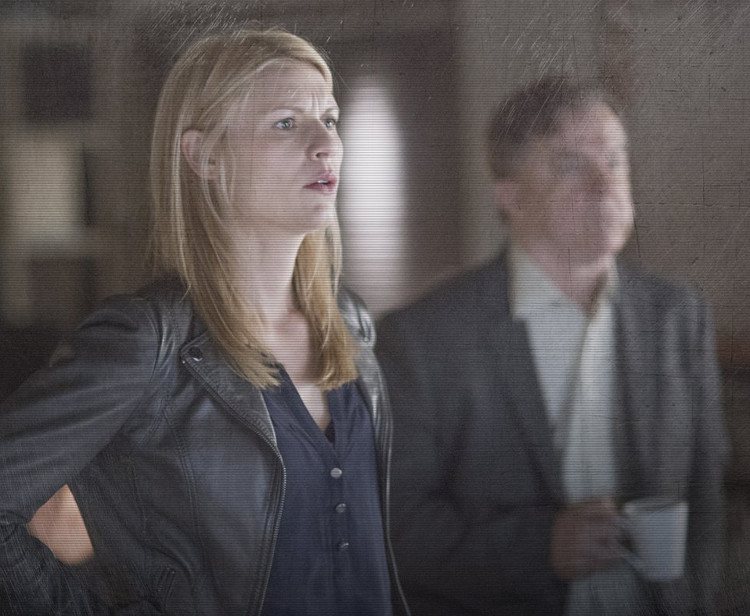“Homeland” is back with a fury. For those who were concerned that with the absence of Nicholas Brody (played by the brilliant Damian Lewis), the Emmy-winning Showtime series would become flat and meandering, this half-season recap will assure you that there is plenty of compelling action, engrossing mystery and deepening character development of the full-blooded people we have come to care about.
They don’t need Brody to anchor this show. (Bonus: no Brody means no Brody’s daughter, Dana, she of the perpetually furrowed brow.)
“Homeland” has always been about Claire Danes’ Carrie Mathison.
When Season 3 left off, Carrie was pregnant with Brody’s baby and had been offered her dream post: CIA station chief in Kabul. In the season finale she’d seen her love publicly executed in Tehran. Then back home at Langley, she sharpied a star for Brody’s heroic service on the wall of the CIA headquarters, making her iconic frowny face as she did so. The answer to the question that had plagued the first three seasons was finally put to rest: he was a good guy after all. It turned out, however, that politics wouldn’t let the rest of the world ever know this. Ergo, her frowny face.
Season 4 opens on Carrie “The Drone Queen” Mathison’s birthday. We learn that she’s birthed her baby and left her in the care of her sister. The first thing we notice is how emotionally detached she is: from ordering drone attacks unflinchingly (all hail the Queen!) to letting go of her little daughter, after flirting briefly with the idea of drowning her in a bathtub.
Carrie’s a bigger wreck then we’ve ever seen her. As the season unfolds, we note that, along with Brody’s child, she has forsaken whatever moral center she might have possessed—all in the name of the greater good, which, to Carrie, is always equated with national security.
Under the guise of avenging the death of Sandy Bachman, the Islamabad station chief murdered by a mob under suspicious circumstances, Carrie has manipulated the new CIA director into making her Bachman’s replacement in Pakistan (probably the most dangerous post in the whole wide world). There is little doubt that her motivation is to get to the bottom of the conspiracy that led to his murder—but there’s more to it.
She cannot afford to access any emotions—if she lets herself become vulnerable enough to love her baby, the floodgates of all the trauma she experienced with Brody will be forced open. As unstable as she is, she cannot afford to let that happen. The Islamabad post is about being too busy to feel.
In contrast to her, Peter Quinn (played with fantastic intensity by British actor Rupert Friend) is making the opposite emotional journey. He wants to end his career as a CIA assassin, yet he finds himself so ensnared by romantic feelings for Carrie that he lets her lead him back to Islamabad. If we had one criticism of this season, it would be here. The writers have taken their time to paint three-dimensional characters full of contradictions, growths and regressions, and complicated motivations. To reduce Quinn to a lovelorn puppy dog does him a disservice. This man is a licensed killer. Seriously.
(But could this just be Badass Carrie rubbing off on me?)
We’re further introduced to Carrie’s pathological detachment by the way she manipulates the character Aayan Ibrahim (Suraj Sharma, the terrific actor from “Life of Pi”). As the nephew of the CIA’s number one target, Taliban leader and terrorist Haissan Haqqani, Aayan is the only known survivor of a botched CIA drone strike at a wedding that killed all of his family except, as it turns out, his notorious uncle, who was spotted there. Many other civilians also died—on Carrie’s orders. Posing as a journalist, Carrie seduces young Aayan in order to get intel on his uncle’s whereabouts. All in the name of national security. Quinn is both horrified and jealous, while Carrie remains dedicated to the task at hand, knowing that an ugly end awaits her young asset.
But an emotional breakthrough will come for Carrie. We predict that it will appear in the form of Saul Berenson, the former Director of the CIA, and Carrie’s mentor/father figure (wonderfully played by Mandy Patinkin).
After being forced out of the Agency, Saul has taken a position as a consultant in the private sector. We’ve been assured that he is taking a backseat to his wife’s career, both as a testament to his love for her and a sign of his commitment to their marriage.
So you know that won’t last.
We immediately see that the situation in Islamabad is dysfunctional: the CIA is spying on itself. Carrie is tailed by her own staff. And the husband of the U.S. ambassador to Pakistan, an unsympathetic dishrag named Dennis Boyd (Mark Moses from “Mad Men”), is selling classified information to Pakistan’s Inter-Serve Intelligence (ISI), an insidious, smart, and well-organized outfit run by the truly terrifying Tasleem Qureshi (Nimrat Kaur).
In Qureshi, Carrie Mathison has met her match. Yet halfway through the season, she still hasn’t realized it, a distinct disadvantage that builds serious tension as we wait for her to catch up.
Which brings us to Sunday night’s episode—spoiler alert! Saul remains in the clutches of the terrorist Haqqani, serving unwittingly as his “God-given” human shield in case anyone watching from afar has the urge to unleash another drone strike. Boyd, the ambassador’s double-dealing, drunken, plagiarizing douche-bag husband (we really don’t like the guy), has switched Carrie’s bipolar meds with an unknown drug, on the orders of Qureshi, who had surreptitiously given him a key to her apartment. As a result of the switch, the episode turns kaleidoscopic, where the effects of the drug intensify from scene to scene, and the audience feels the confusion, the intensity of sound, and the confounding actions that end with Carrie in the arms (literally) of the ISI.
The emotion that she has kept in check with such steadfast focus and medication has broken loose, turning into a tidal wave-like spectacle of a breakdown. In her drug-induced hallucination, we see what is always at the periphery of Carrie’s consciousness: Nicholas Brody.
She has been out-played, that much is clear. For any unsympathetic viewers, who might have been taken aback by her character’s callous manipulation—especially that bathtub scene, where postpartum depression was explored in a bright, relentless light—this is where she gets them back.
We are left with questions: where is she now? How will she get out?
Here’s our guess: Saul will play a significant role in Carrie’s escape. He’ll bring her back home, both physically and emotionally. Although the show has always focused on Brody as Carrie’s love interest, Saul is the moral center, the grounded beacon of truth, light, and safety. On foreign soil, Saul Berenson is Carrie’s homeland.






















